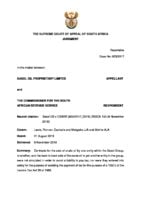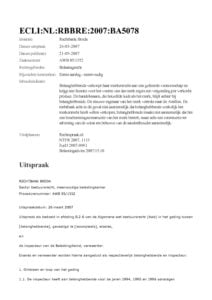Category: Commercially Irrational Transactions
In transfer pricing transactions may be disregarded, and if appropriate, replaced by an alternative transaction, where the arrangements made in relation to the transaction, viewed in their totality, differ from those which would have been adopted by independent enterprises behaving in a commercially rational manner, thereby preventing determination of a price that would be acceptable to both of the parties taking into account their respective perspectives and the options realistically available to each of them at the time of entering into the transaction.
It is also a relevant pointer to consider whether the MNE group as a whole is left worse off on a pre-tax basis sincethis may be an indicator that the transaction viewed in its entirety lacks the commercial rationality of arrangements between unrelated parties.
The key question in the analysis is whether the actual transaction
possesses the commercial rationality of arrangements that would be agreed
between unrelated parties under comparable economic circumstances, not
whether the same transaction can be observed between independent parties.

Poland vs “E S.A.”, June 2023, Provincial Administrative Court, Case No I SA/Po 53/23
UK vs BlackRock, July 2022, Upper Tribunal, Case No [2022] UKUT 00199 (TCC)

Poland vs D. Sp. z oo, April 2022, Administrative Court, Case No I SA/Bd 128/22

Poland vs “X-TM” sp. z o.o., March 2022, Administrative Court, SA/PO 1058/21

Spain vs SGL Carbon Holding, September 2021, Tribunal Supremo, Case No 1151/2021 ECLI:EN:TS:2021:3572

UK vs Blackrock, November 2020, First-tier Tribunal, Case No TC07920
UK vs Total E&P North Sea UK Ltd, October 2020, Court of Appeal, Case No A3/2019/1656

Canada vs AgraCity Ltd. and Saskatchewan Ltd. August 2020, Tax Court, 2020 TCC 91

UK vs General Electric, July 2020, High Court, Case No RL-2018-000005

Russia vs ViciunaiRus LLC, April 2020, Supreme Court, Case No. A21-133/2018

Greece vs “VSR Inc”, December 2019, Court, Case No A 2631/2019

Greece vs “SH Loan Ltd”, May 2019, Court, Case No A 1780/2019

Spain vs SGL Carbon Holding, April 2019, Audiencia Nacional, Case No ES:AN:2019:1885

Russia vs ViciunaiRus LLC, December 2018, Court of Appeal, Case No. A21-133/2018

South Africa vs Sasol Oil, November 2018, Supreme Court of Appeal, Case No 923/2017
Netherlands vs B.V, July 2018, Hoge Raad Case No 17/04930 17/05713 17/05714
US vs Reserve Mechanical Corp, June 2018, US Tax Court, Case No. T.C. Memo 2018-86

Germany vs Hornbach-Baumarkt, May 2018, European Court of Justice, C-382/16

Spain vs ICL ESPAÑA, S.A. (Akzo Nobel), March 2018, Audiencia Nacional, Case No 1307/2018 ECLI:ES:AN:2018:1307

Norway vs Hess Norge AS, May 2017, Court of Appeal

Norway vs. IKEA Handel og Ejendom, October 2016, HRD 2016-722
Malaysia vs Ensco Gerudi, June 2016, High Court, Case No. 14-11-08-2014

Brazil vs Macopolo, July 2014, Supreme Tax Appeal Court, Case no 9101-001.954

Nederlands vs. Corp, January 2014, Lower Court, Case nr. AWB11/3717, 11/3718, 11/3719, 11/3720, 11/3721

New Zealand vs Alesco New Zealand Limited and others, Supreme Court, SC 33/2013, NZSC 66 (9 July 2013)

Switzerland vs. Corp, Juli 2012, Federal Supreme Court, Case No. 2C_834-2011, 2C_836-2011

Netherlands vs Corp, 2011, Dutch Supreme Court, Case nr. 08/05323 (10/05161, 10/04588)

Nederlands vs. Corp, July 2011, Lower Court AWB 08/9105

Norway vs. Telecomputing, June 2010, Supreme Court case nr. HR-2010-1072-A

Netherlands vs “X Beheer B.V”, May 2008, (Hoge Raad) Dutch Supreme Court, Case no. 43849, VN 2008/23.14

Brazil vs Marcopolo SA, June 2008, Administrative Court of Appeal (CARF), Case No. 11020.004103/2006-21, 105-17.083
Turkey vs Headquarter Corp, September 2007, Danıştay Üçüncü Dairesi, E. 2007/89 K. 2007/2446, T. 20.09.2007

Netherlands vs Shoe Corp, June 2007, District Court, Case nr. 05/1352, VSN June 2, 2007

